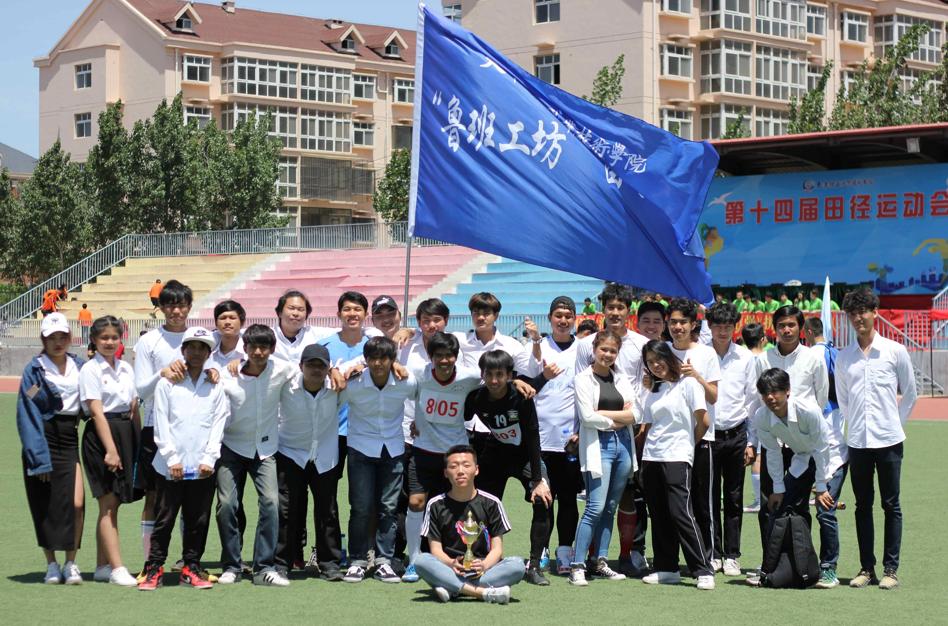Luban Workshop: empowering technical talents along the Belt and Road
Ayutthaya, the world heritage listed city some 80-km north of Thailand's capital Bangkok and a promising automobile and electronic information industry hub, is now a symbolic city for China's vocational education exchanges with the world.
Back in 2016, the Tianjin Bohai Vocational Technical College and the Phra Nakhon Si Ayutthaya Technical College jointly put the world's first Luban Workshop into operation. The program is named after Lu Ban, an ancient Chinese woodcraft master believed to be the father of Chinese carpentry and architecture, and takes aim at cultivating technical experts worldwide to serve either countries' economy and society. After 5 years of development, the workshop has yielded fruitful results and formed a replicable and sustainable apprenticeship model to share Chinese experience in the area of vocational education.
"The workshop is our pride. It records the exchanges between our two countries," said Mayuree Sriraboot, principal of the Phra Nakhon Si Ayutthaya Technical College.

Thai students study at the Luban Workshop. (Photo/ Provided to People's Daily Online)
Answering the needs of the cooperating countries
Like all teachers, Yanawan Kengthanoommar, a 51-year-old teacher at the Thai Luban Workshop, hopes her student will be able to graduate successfully, find a job and then become a better person to help advance social development. The Luban Workshop is making it come true.
She teaches mechatronics, the first major established at the workshop, instructing students in digital circuits, pneumatic and hydraulic systems, and system control. Other majors are related to new energy vehicles, the Internet of Things, and CNC machining, which were also created in the ensuing years.
"Nearby industrial zones are applying more and more automation equipment and industrial robots in their factories, which demands a growing number of talents in relevant fields," said Yanawan. And for her, the curriculum responds exactly to the needs of the country's labor market and industrial development.
In 2018, the Railway Center of the workshop was rolled out after partnering with Tianjin Railway Technical and Vocational College and eight other Thai vocational colleges, adding two new majors –namely, high-speed railway maintenance technologies and the automatic control of railway signals– in order to upskill learners and gradually weave a railway-related education network that covers Thailand and neighboring Southeast Asian countries.
For the Thai teachers, the curricular design of the Luban Workshop is also truly helpful for the students' future careers. "Now education in NEV repair and automation and control, for example, are lagging relatively behind. Teaching equipment is sometimes too expensive to afford," Mayuree told People's Daily Online.
At present, the two-story workshop covers an area of 2,000 square meters, with 14 learning zones and 6 majors. "These are all very promising majors. Our students are also very interested in this cooperative project," said Jarun Youbrum, the former principal of the Phra Nakhon Si Ayutthaya Technical College.
The Thai workshop is also open for vocational exchanges across Thailand and neighboring countries. In the past few years, it has welcomed over 7,500 teachers and students from 50 plus vocational schools in Thailand, and over 100 students from countries including Malaysia, Vietnam, Singapore and others.
"The Thai Luban Workshop has already become the resource center for vocational colleges in Thailand and even our neighboring countries," said Jarun in an interview with China Education Daily.

Teacher of the Railway Center of the Thai Luban Workshop receives railway maintenance training from Chinese staff. (Photo/ Provided to People's Daily Online)
Providing Chinese solutions to empower local talents
Though based in foreign colleges, the Luban Workshops are equipped with Chinese teaching methods, equipment, organizing experience, and many other self-developed resources.
At the Thai Luban Workshop, engineering courses are delivered in a project-oriented and innovative way, or under the EPIP (engineering practice innovation project) model, based on which Chinese scholars have developed varied course standards, bilingual textbooks, as well as experimental manuals and online open classes.
Now, all the six majors in the workshop have been recognized as part of Thailand's national education system, filling in the country's gaps in terms of its vocational education.
Chinese companies have also played a significant role in cooperating with vocational colleges to establish teaching standards and providing training equipment. Through the platform of the Railway Center, Tianjin companies and over 10 Thai companies in the past few years have generated over 40 million yuan in sales orders, which has in turn boosted the economic development of Tianjin.
In addition to ensuring the teaching quality of the Luban workshops before launching a workshop, Chinese colleges will provide systematic training for the teachers, preparing them with the latest teaching aids and models.
Thai students also have opportunities to apply for student exchange programs in China. During the past five years, the Thai Luban workshop has facilitated exchanges for over 200 students, while providing them with extra training in Chinese language and culture, mathematics, mechanics, etc.
As for the teachers, such exchanges are eye-opening and excellent learning opportunities. "It’s important to learn Chinese since more and more Chinese companies are doing business in Thailand. They need employees who can speak, read and write their language," said Mayuree.
"Many students have marched onto a more successful path," said the teachers. "They are highly welcomed by local universities and industrial enterprises." Moreover, "some companies even provide about 3,000-8,000 Baht in subsidies for those with Chinese language skills."
During the COVID-19 pandemic, faculty in both China and Thailand tried to make do with virtual classes and came up with different teaching plans to keep the workshop running. "Now things are getting better. We are still teaching online, but all the students were asked to get vaccinated,” said Yanawan. “In December, students will finally be able to return to school again."

Thai exchange students from the Luban Workshop participate in sporting activities at the Tianjin Bohai Vocational Technical College in China. (Photo/ Provided to People’s Daily Online)
Forming a replicable national brand for Belt and Road countries
The Lu Ban name, after being lent to the overseas vocational workshops, has generated new meaning and represents the spirit of Chinese craftsmanship. With more and more workshops being launched around Asia, Europe and Africa, replicable and sustainable ways of establishing similar Luban Workshops have been formed.
Apart from the ones set up by vocational schools between the two cooperating countries based on popular majors, like the one launched in Thailand, workshops are also being initiated via cooperative college-company initiatives. Besides, some workshops are also relying on the engagement of inter-governmental strategic cooperation.
In Cambodia, the workshop was carried out under the Lancang-Mekong cooperation framework. Some of the other workshops were aimed at serving major projects with the Belt and Road Initiative, including the Addis Ababa-Djibouti Railway, the China-Laos Railway, and the Budapest-Belgrade Railway, among others. In 2018, China also announced that 10 Luban Workshops would be established in Africa to provide vocational skills training for African youths under the framework of the Forum on China-Africa Cooperation and in line with the African Union’s Africa 2063.
At present, the Luban Workshop model has been promoted to encompass over 20 countries, many of which, including the 14 workshops in Africa, were initiated amid the COVID-19 pandemic after surmounting and multiplying challenges.
High-quality vocational education is essential to a country’s industrial development. As Chinese vocational education goes global, the Luban Workshop will continue to share Chinese wisdom with the rest of the world.
Photos
Related Stories
- Cumulative value of trade in goods between China and BRI countries reaches $10.4 tln
- China and BRI countries share fruits of agricultural cooperation under BRI
- Guinea-Bissau joins Belt and Road Initiative
- Feature: Chinese firm seeks to integrate Chinese, Egyptian construction standards for common development under BRI
- A road to connectivity: build a bridge of friendship together
Copyright © 2021 People's Daily Online. All Rights Reserved.










